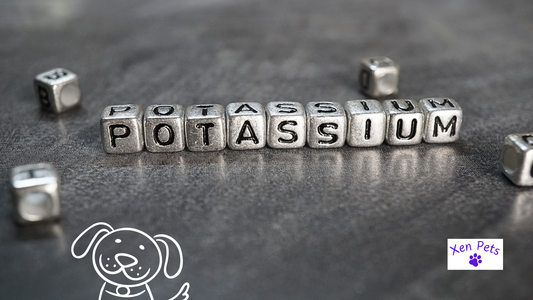Golden Retriever Separation Anxiety
Tory JohnsonShare
Do you have an anxious Golden Retriever? Goldens are one of the most beloved breeds of dog in the world and are friendly, outgoing, and always happy to see their humans.
However, many dogs suffer from anxiety, especially Golden Retrievers, and it can be a big problem.

In this post, we'll explore what causes anxious dogs and how you can help your furry friend overcome it. Stay tuned!
Golden retriever separation anxiety
Golden Retrievers are known for their separation anxiety. They whine, howl, bark, or pace back and forth when left alone. They may also destroy furniture or have accidents inside the house.
While separation anxiety is definitely a nuisance, it's important to remember that it's a very real condition that can cause a lot of stress for both your dog and yourself. And as dog owners, it's important to be aware of the critical signs of stress in a dog. Stress can lead to emotional, physical, and behavioral problems.

If you're dealing with a Golden Retriever with separation anxiety, there are a few things you can do to help ease their anxiety.
- First, try to create a calm environment before you leave the house. This means no loud noises or sudden movements.
- Secondly, make sure you give your dog plenty of exercise before you leave so they'll be tired when you're gone.
- Finally, leave them with a special toy or treat that they only get when you're not home.
With a little patience and effort, separation anxiety doesn't have to be a nightmare for either of you. Keep reading to learn more about your golden retriever's anxiety.
Golden Retriever anxiety symptoms
Different dogs will show different symptoms of anxiety. If your dog is a Golden Retriever, here are some common anxiety symptoms to look out for:
- Your dog may startle easily or become agitated for no apparent reason.
- He or she may pant excessively or pace back and forth.
- Your dog may refuse to eat or have accidents inside the house.
- Your dog can become clingy or attached to you and follow you everywhere you go.
- He may become aggressive or destructive because of separation anxiety
- Read dog body language and understand if something is upsetting
If you notice any of these symptoms in your Golden Retriever, it's important to talk to your veterinarian.
They can help you identify the cause of your dog's anxiety and develop a treatment plan. With a little help, your dog can overcome his anxiety and live a happy, healthy life.
4 Types of anxiety in Golden Retrievers
If you thought there was only one type of anxiety, think again! Turns out, there are all sorts of anxieties out there, each with its own unique set of symptoms. So what's the difference between all these anxieties? Well, that's what we're here to explore!
 Social anxiety
Social anxiety
Agoraphobia
An intense fear of being in open or public spaces.
Dog anxiety
Characterized by excessive panting, whining, and shaking when around dogs.
Generalized anxiety disorder
Characterized by constant worry and stress about everyday activities and events.
So there you have it. A quick overview of some of the different types of anxiety out there.
Now that you know a little bit more about them, maybe you'll be able to better understand (and cope with) your own anxiety. Or maybe you'll just be able to sympathize with your dog the next time he starts shaking uncontrollably at the sight of a simple mailbox.
Either way, we hope this information was helpful!
Wrap Up: Golden Retriever anxiety
Overall, if your dog is experiencing anxiety, consider seeking help from a professional dog trainer or their vet.
From there, you can work on management and trying different techniques to see what works best for your pup.
Shop today: Calming Chews for Free Shipping.
Frequently Asked Questions:
How can I help my Golden Retriever with anxiety?
If your Golden Retriever is displaying signs of anxiety, there are a few things dog owners can do to help. First, try to identify the source of their anxiety. Is it loud noises, being left alone, or something else? Once you know what's causing their anxiety, you can take steps to help them feel more comfortable.
For example, if they're anxious about being left alone, you can provide them with a Kong toy filled with treats to keep them occupied. If noise is the issue, try using a sound machine or earplugs to help muffle the noises that are bothering them.
You can also talk to your vet about chronic anxiety medication if other methods don't seem to be working. With a little patience and effort, you can help your dog learn to cope with their anxiety and live a happy life.
Is anxiety common in golden retrievers?
Yes, golden retrievers are prone to anxiety, and it's something that all potential owners should be aware of. While anxiety is common in all dogs, golden retrievers seem to be particularly prone to it. This may be due to their high intelligence or their sensitive nature.
Whatever the cause, golden retriever owners must be prepared to deal with their dog's anxiety.
Why do golden retrievers get anxiety?
Golden retrievers were bred to work closely with humans, and as a result, they form very strong bonds with their owners. This can lead to separation anxiety when they're left alone, which can manifest in excessive barking at night, destructive behavior, and even depression. Even a young golden retriever puppy can experience separation anxiety.

If you have a golden retriever, it's important to make sure they get plenty of exercise and attention to help prevent and treat anxiety.
How do I know if my Golden Retriever is anxious?
Here are a few telltale signs that your golden retriever may be feeling anxious:
- Panting or heavy breathing
- Trembling or shaking
- Hiding or whining
- Refusing to eat or drink
- Acting out of character (e.g., aggression)











